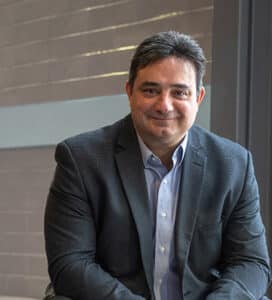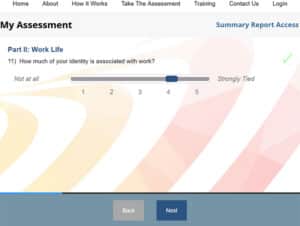Robert Laura enjoyed his therapist job after graduating with a degree in social work.
But when it came time to go back for a master of social work for the next step in his profession, he says, “I didn’t want to pay the $30,000 to make 50 more cents.”
A financial advisor was born.
Like the mishap that dunked the proverbial first chocolate bar into a jar of peanut butter, it turns out the two skills go together well.
Laura, president of Wealth and Wellness Group investment advisors in Michigan and author of “Naked Retirement,” is also CEO of the Retirement Coaches Association, which he founded in 2017.
That full-time contact with financial advisors discussing the ins and outs of the profession led to his newest venture: The RQ Assessment.
RQ – retirement quotient – is a tool to give financial advisors a competitive edge with clients, Laura says.
The ‘X’ factor
Two years in the making, the RQ tool is a 56-question personal assessment designed to measure clients’ social readiness to retire. It elicits knowledge about retirement and values about work and personal life.

Laura believes it’s a unique approach. Instead of sole reliance on age and assets to plot retirement benchmarks, Laura devised a social-oriented formula: IQ + EQ + SQ + AQ = RQ.
Translated to English: Intelligence Quotient + Emotional Quotient + Spiritual Quotient + Adversity Quotient = Retirement Quotient.
The higher the test score, the more likely a person is to make a fulfilling transition to retirement, Laura says. The ideal time to take the test is one to 10 years before retirement.
“Different people retire differently,” Laura says. “There’s not one idea of a successful retirement.”
The RQ tool is more about mindset and adaptability than a score, age or asset level, Laura says. It’s a nonfinancial self-portrait that uses personality, preference, behaviors and expectations to identify and focus on factors that closely affect the retirement planning and transition.
The RQ Assessment launched a few months ago – costing $29 through November and $99 thereafter – giving clients a personal 15-page report and access to a group report discussion and counseling.
Road to invention
As it turned out, his first career prepared Laura well.
“When I started down this path, I wanted (the RQ) to be clinically validated,” he said. “But that was a terrible tool.”
His academic version with statistical validity required at least 180 questions with redundancy.
“Then, you have to ask those questions in weird ways. It wasn’t going to work” in practical use, he says.
He pulled it back to a practical, commonsense 56-question survey, “a happy medium of something useful.”
“Retirement is life changing. You don’t need a doctorate. You just need to care about what makes people tick to change people’s lives,” Laura says.
His early, “chocolate” work experience prepared him for that.
“The social work background was some of the best training I could have ever had, because social workers write SOAP (subjective, objective, assessment and plan) notes describing how a person reacts,” Laura says.
“In this assessment, you might say, ‘Client raised their eyebrows’ or ‘sat with arms folded.’ You’re especially taught how to read body language,” he says.
“That has been invaluable to me in working with people. If a husband and wife are sitting with me talking about retirement and one has their arms crossed or hand over their mouth, I can address that,” he says. “It was really helpful for me to understand all that stuff before I got into the (financial advising) industry.”
The “peanut butter” of his Retirement Coaches Association is the full-time opportunity to talk to thousands of financial advisors about subjective evaluations of retirement preparedness. Financial planners come together to “modernize retirement” by sharing research, issues and ideas, Laura says, culminating in a conference that hosts national experts every September.
“It’s a tremendous advantage,” he says. “For me, this is about both a passion and a purpose.”
Laura envisions all financial advisors adopting the RQ Assessment in their client portfolios. Women seem to understand the value of the RQ better than men, he says. Sixty to 75%f of the group workshops so far have been women.
Although Laura had no “You got peanut butter on my chocolate” moment, like peanut butter cups, he says he did have “guideposts along the way.”
“There’s such a strong line between the hard side and the soft side (of retirement planning), and people have too often portrayed the soft side as unnecessary, as nonessential, because it can’t be monetized. I knew if I was going to put this industry into the forefront, we were going to have to find some middle ground … to build that bridge,” he says.
Retirement is hard
 A common denominator Laura identified both in his own clients and his coaching work is the illusion of retirement.
A common denominator Laura identified both in his own clients and his coaching work is the illusion of retirement.
“You’re going into this a minefield of change, and everyone around you is treating it as if it’s a happy, carefree time,” Laura says.
Yet neither society nor corporate retirement-planning programs understand the drastic personal adaptation ahead for retirees.
It’s important for each person to evaluate what they want and not what others think. For example, he says, research shows retirees need lots of friends, but a client might be someone who’s happiest with just one or two close friends.
“So, research doesn’t always take into account that human element that people need … or plan for what they want,” Laura says. No one really “fits in the box.”
Retirement is not just about the money, he says. People often lose their sense of purpose and direction in life, if they haven’t formed a sensible plan for themselves.
“The sooner clients and advisors ‘get’ that money is just a small part, about 20%, of an overall retirement plan because all these other (subjective) factors,” Laura says, “they’ll see that it’s about making an impact” in retired life.
The definition of retirement is changing, too, Laura says.
“You’re not done at 62 or 65 or 67 or 70. Age doesn’t mean you have to retire,” Laura says. “We’re seeing people at 65 say, ‘Wait a minute. The gas tank is not empty here. I like what I do, and I have life balance.’”
“But society hasn’t caught up. We want to change that,” he says.
Linda Hildebrand is a longtime newspaper editor and consumer-action reporter.







